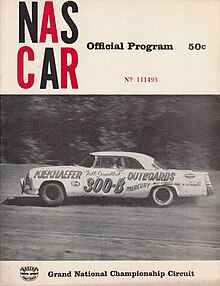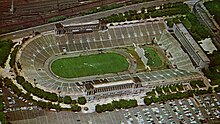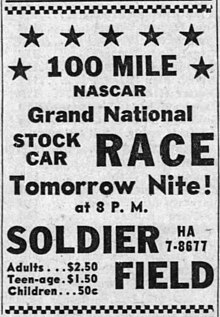On July 21, 1956, the NASCAR Grand National Series (today known as the NASCAR Cup Series) held the 33rd race of its season at Soldier Field in Chicago. The race was won by Fireball Roberts, and is today considered the only NASCAR Cup Series race to have been held at the venue.(note a)
| Race details | |||
|---|---|---|---|
| Race 33 of 56 in the 1956 NASCAR Grand National Series season | |||
 Cover of the program for the race | |||
| Date | July 21, 1956 | ||
| Location | Soldier Field, Chicago | ||
| Course |
Permanent racing facility 0.5 mi (80 km) | ||
| Distance | 200 laps, 100 mi (160.9 km) | ||
| Average speed | 61.037 miles per hour (98.230 km/h) | ||
| Attendance | 14,402 | ||
| Pole position | |||
| Driver | Bill Stroppe | ||
| Most laps led | |||
| Driver | Jim Paschal | Hayworth | |
| Winner | |||
| Roberts | DePaolo | ||


Background
editThe NASCAR Grand National Series (today known as the NASCAR Cup Series) had first visited the Chicagoland area in 1954, when a reported crowd of 6,000 watched a race at the suburban Santa Fe Speedway.[1][2] For the 1956 season, NASCAR held races at Soldier Field in Chicago, including this Grand National Series race and two Convertible Division races.[1] Soldier Field had been regularly used as an auto racing venue since the 1940s.[3]
This was the first NASCAR Grand National Series/NASCAR Cup Series race to be held in the city of Chicago.[4] It is today regarded to have been the only NASCAR Cup Series race held at the Soldier Field.[5][6][7][8] (note a)
To accommodate NASCAR races in 1956, a new half-mile track layout was added to the stadium by adding new paved track to the north end of the stadium.[9] The race was promoted by Andy Granatelli,[10] at the time the key promoter of races at Soldier Field.[11] Granatelli worked with NASCAR head Bill France Sr. to schedule the race.[10]
It had been thirteen days between the Soldier Field race and the previous NASCAR race at California State Fairgrounds.[12] A race that had been scheduled to be held at Old Bridge Stadium in Old Bridge, New Jersey during the weekend in-between these two races was called-off due to rain.[13]
Race summary
editHeld July 21, 1956,[4] the race used the stadium's half-mile short track configuration.[14] At 200 laps, the race's length was 100 miles.[15] Attendance at the race was 14,402.[4] The race was contested by twenty-five drivers. While not an extraordinarily large number of drivers, some of the season's largest stars were among the competitors.[3] Five competitors were future NASCAR Hall of Famers. The pole winner was Billy Myers.[16]
The race was won by Fireball Roberts, who beat Jim Pascal by one car-length.[4] Pascal had been the lap leader until the 194th lap, when Roberts surpassed him.[4] Roberts was driving a Ford for Pete DePaol's team. Third-place finisher Ralph Moody was also driving for DePaolo. The fourth, fifth, and sixth-place finishers (respectively: Speedy Thompson, Frank Mundy, and Buck Baker) all were racing for Carl Kiekhaefer's team,[10] which had dominated the 1956 Grand National Series season.[17] Ten cars failed to finish the race.[3] Five of these were sidelined due to brake issues, a regular problem on short tracks.[16]
Race stats
edit| Winning driver: | Fireball Roberts |
|---|---|
| Winning team: | DePaolo |
| Winning car make: | 1956 Ford |
| Track description: | 0.5-mile (0.80 km) paved short track oval |
| Laps: | 200 |
| Length: | 100 miles (160 km) |
| Competitors: | 25 drivers |
| Attendance: | 14,402 |
| Duration: | 1:38:18 |
| Avg. speed: | 61.037 mph (98.230 km/h) |
| Margin-of-victory: | 1 car-length |
Results
editLegend:
- Finish: Finishing place of driver
- Start Pos.: Starting position of driver
- Car #: Car number
- Driver: Driver's name
- Sponsor: Sponsor of driver
- Owner/Team: Owner/team for which driver drove
- Car make: Make of car driven
- Laps: Laps completed
- Money: Earnings for race
- Status: If car was running at end of race, or otherwise the reason it was out of the race
| Finish | Start Pos. |
Car # |
Driver | Sponsor | Owner/ Team | Car make |
Laps | Money | Status |
|---|---|---|---|---|---|---|---|---|---|
| 1 | 3 | 22 | Fireball Roberts | DePaolo Engineering | Pete DePaolo | 1956 Ford | 200 | $850 | running |
| 2 | 14 | 75 | Jim Paschal | C U Later Alligator | Frank Hayworth | 1956 Mercury | 200 | $625 | running |
| 3 | 4 | 12 | Ralph Moody | DePaolo Engineering | Pete DePaolo | 1956 Ford | 200 | $450 | running |
| 4 | 12 | 500 | Speedy Thompson | Carl Kiekhaefer | 1956 Dodge | 200 | $350 | running | |
| 5 | 8 | 500B | Frank Mundy | Carl Kiekhaefer | 1956 Dodge | 200 | $310 | running | |
| 6 | 9 | 502 | Buck Baker | Carl Kiekhaefer | 1956 Dodge | 199 | $250 | running | |
| 7 | 13 | 31 | Bill Champion | John Whitford | 1956 Ford | 199 | $200 | running | |
| 8 | 6 | 32 | Paul Goldsmith | Smokey Yunick | 1956 Chevrolet | 198 | $150 | running | |
| 9 | 7 | 719 | Joy Fair | Russell Wainscott | 1956 Dodge | 192 | $100 | running | |
| 10 | 10 | 42 | Lee Petty | Petty Enterprises | 1956 Dodge | 190 | $100 | running | |
| 11 | 20 | 7 | Bob Esposito | – | 1955 Oldsmobile | 189 | $100 | running | |
| 12 | 23 | 33 | Frank Edwards | – | 1956 Chevrolet | 182 | $100 | running | |
| 13 | 22 | 48 | Bill Massey | Don Holcomb | 1956 Ford | 176 | $100 | running | |
| 14 | 21 | 38 | Chuck Mesler | – | 1956 Dodge | 175 | $100 | running | |
| 15 | 15 | 66 | Al Watkins | Al Watkins | 1956 Ford | 164 | $100 | running | |
| 16 | 24 | 2 | Sal Tovella | – | 1956 Ford | 142 | $100 | brakes | |
| 17 | 1 | 14 | Billy Myers | Bill Stroppe | 1956 Mercury | 140 | $100 | brakes | |
| 18 | 2 | 92 | Herb Thomas | Herb Thomas | 1956 Chevrolet | 98 | $100 | crash | |
| 19 | 17 | 204 | Darvin Randahl | Darvin Randahl | 1956 Ford | 86 | $50 | brakes | |
| 20 | 11 | 150 | Fred Lorenzen | Fred Lorenzen | 1956 Chevrolet | 85 | $50 | brakes | |
| 21 | 16 | 40 | Bob Chauncey | – | 1956 Pontiac | 78 | $50 | spindle | |
| 22 | 5 | 3 | Tom Pistone | – | 1956 Chevrolet | 50 | $50 | brakes | |
| 23 | 19 | 44 | Bill Vesler | – | 1955 Chevrolet | 41 | $50 | crash | |
| 24 | 18 | 165 | Kenny Paulsen | – | 1955 Chevrolet | 40 | $50 | engine | |
| 25 | 25 | 37 | Ray Crowley | Ronnie Duman | 1956 Plymouth | 36 | $100 | carburetor |
Subsequent history of NASCAR in the Chicago area
editThe 1957 edition of Soldier Field's annual Chicago Park District Police Benevolent Association Gold Trophy Race (held on June 15, 1957) was sanctioned by NASCAR as a 50-lap short track race under the "NASCAR Grand National" banner.[22] Despite the 1957 race being considered at the time it was held to have been a NASCAR Grand National Series event, it is not retrospectively considered to have been an official part of the 1957 NASCAR Grand National Series.[8] For reasons that are unclear, Soldier Field never held another NASCAR Cup Series race.[3] NASCAR ceased holding any races at Soldier Field after 1957.[23][24]
NASCAR Winston Racing Series races were held in the Chicagoland area at the Santa Fe Speedway, which was ultimately demolished in 1995.[1] NASCAR returned to the Chicagoland area for the 2000 NASCAR Craftsman Truck Series, with the Sears Craftsman 175 being held at the Chicago Motor Speedway in Cicero, Illinois.[citation needed] The NASCAR Cup Series would not return to the Chicagoland area until 2002, when the 2002 Tropicana 400 was held at the Chicagoland Speedway in Joliet, Illinois.[25] NASCAR would not return to the city proper again until 2023, when the Xfinity Series held The Loop 110 and the NASCAR Cup Series held the Grant Park 220 at the Chicago Street Course.[citation needed]
See also
editNotes
edit^note a The 1957 edition of Soldier Field's annual Chicago Park District Police Benevolent Association Gold Trophy Race (held on June 15, 1957) was sanctioned by NASCAR as a 50-lap short track race under the "NASCAR Grand National" banner.[22] It was won by Bill Brown. However, while this 1957 race was considered to be a NASCAR Grand National Series event at the time it was held, by the 2010s it did not appear on NASCAR's retrospective lists of Grand National events that were held in the 1957 NASCAR Grand National Series.[8]
References
edit- ^ a b c Kalwasinski, Stan. "History Lesson: Chicago and NASCAR". speedsport.com. Speed Sport Insider. Retrieved 28 November 2023.
- ^ Reardon, Logan (27 June 2023). "NASCAR roots in Chicago date back to 1954, including races at Soldier Field". NBC Chicago. Retrieved 28 November 2023.
- ^ a b c d Hembree, Mike (11 December 2022). "NASCAR's Wild Night of Racing at Chicago's Soldier Field in 1956". Autoweek. Retrieved 15 November 2023.
- ^ a b c d e f g Grossman, Ron (28 June 2023). "During Chicago's auto racing heyday, a NASCAR race in Soldier Field ended in a razor-slim victory by Fireball Roberts". Chicago Tribune. Retrieved 15 November 2023.
- ^ "Soldier Field". www.racing-reference.info. NACAR Digital Media, LLC. Retrieved 28 November 2023.
- ^ "Checkered Flag Waves for NASCAR Legends story – Soldier Field". laidbackracing.com. Archived from the original on December 24, 2004.
- ^ Higgins, Tom (July 9, 2010). "Chicago's storied Soldier Field was once a NASCAR track". www.thatsracin.com. Archived from the original on January 4, 2011. Retrieved March 10, 2012.
- ^ a b c Ford, Liam T.A. Ford (2009) [2009]. Soldier Field: A Stadium and Its City (1st ed.). Chicago: University of Chicago Press.
- ^ "NASCAR Racing Sat. at Soldier Field". The Daily Calumet. Retrieved 28 November 2023 – via Newspapers.com.
- ^ a b c White, Ben (June 29, 2023). "As NASCAR Returns to Chicago with Road Race, Here's a Look at the City's Racing History". The Fayetteville Observer. Retrieved 28 November 2023.
- ^ Spencer, Reid (June 27, 2023). "75th Anniversary Feature: NASCAR's past and present intersect on Chicago's lakefront". Speedway Digest. NASCAR Wire. Retrieved 29 November 2023.
- ^ "1956-32". www.racing-reference.info. NASCAR Digital Media, LLC. Retrieved 29 November 2023.
- ^ "–Pit Stops– Cotton Vows He'll Catch Dink; Darlington Purse is a Dandy". The Charlotte News. 18 Jul 1956. Retrieved 29 November 2023 – via Newspapers.com.
- ^ "Chicago Soldier Field Speedway (IL)". Speedway and Road Race History. Retrieved 20 November 2023.
- ^ a b c "1956-33". racing-reference.info. Retrieved 23 November 2023.
- ^ a b Martin, Ken (September 14, 2021). "NASCAR has history at stadium venues as it readies for LA Coliseum exhibition opener". NASCAR.com. Retrieved 29 November 2023.
- ^ "NASCAR Team Kiekhaefer Records Sign, 1955-1956". www.thehenryford.org. The Henry Ford. Retrieved 28 November 2023.
- ^ a b "1956 NASCAR Cup Series 1956-33 Race Results - Soldier Field". frcs.pro. Retrieved 24 November 2023.
- ^ "1956-33". www.racing-reference.info. NASCAR Digital Media, LLC. Retrieved 26 November 2023.
- ^ "Soldier Field Race Statistics - NASCAR Series". frcs.pro. Retrieved 25 November 2023.
- ^ "1956 Race 1 at Soldier Field Results". ESPN. Retrieved 28 November 2023.
- ^ a b "Stock Race Marks May Fall Tonight". Chicago Tribune. June 1, 1957. Retrieved 15 November 2023 – via Newspapers.com.
- ^ Jensen, Tom (January 28, 2022). "Stadium Racing Part of NASCAR's Roots | NASCAR Hall of Fame | Curators' Corner". Nascar Hall of Fame. Retrieved 15 November 2023.
- ^ Caraviello, David (September 15, 2012). "Caraviello: In Chicago, Nothing Like a Race at Soldier Field". NASCAR. Archived from the original on December 8, 2015. Retrieved July 30, 2014.
- ^ "That's Racin'". The Kansas City Star. 12 Jul 2002. Retrieved 30 November 2023 – via Newspapers.com.